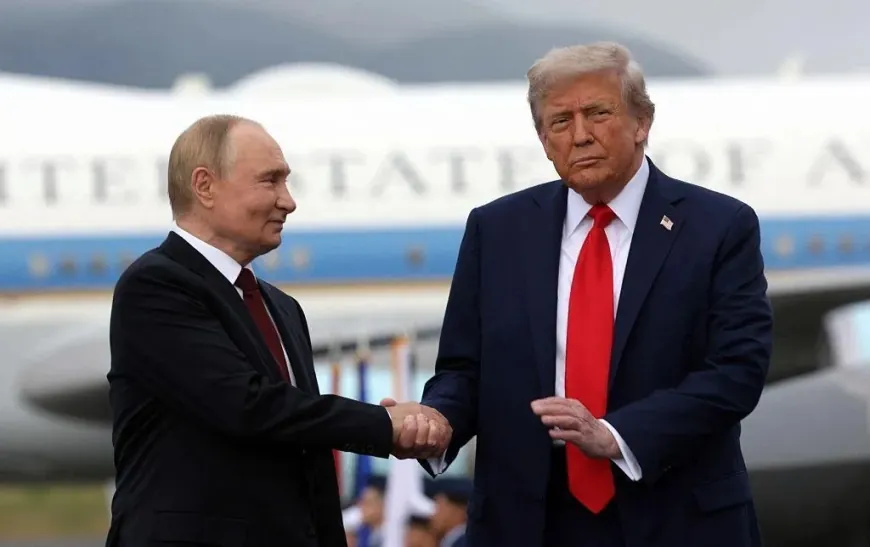Trump Pauses Sanctions on Russia After Alaska Summit, Ukraine Ceasefire Still Stalled
Alaska summit ends with no Ukraine ceasefire; Trump delays sanctions, but Russia’s $35B oil reserves and tanker fleet remain under U.S. economic leverage.

On August 15, 2025, U.S. President Donald Trump and Russian President Vladimir Putin met in Anchorage, Alaska, in a much-anticipated summit aimed at addressing the ongoing conflict in Ukraine. International observers expected discussions on ceasefire mechanisms, territorial concessions, and broader diplomatic resolutions.
The meeting concluded without a formal ceasefire, though both leaders emphasized dialogue. Trump indicated interest in exploring broader peace frameworks, including potential territorial compromises proposed by Putin. According to summit insiders, Putin requested that Ukraine cede parts of the Donbas region, including Donetsk and Luhansk, in exchange for a freeze on Russian military activity in other contested zones.
Ukrainian President Volodymyr Zelenskyy publicly rejected the proposal, citing constitutional protections and warning that any territorial concessions could trigger domestic unrest. “Ukraine will not negotiate its sovereignty,” Zelenskyy stated, emphasizing the need for international guarantees and security assurances.
Diplomats present noted the tense atmosphere, with Trump balancing U.S. leverage against Putin’s carefully framed messaging. Observers described the meeting as a strategic chessboard, with each side testing boundaries without escalating conflict.
Pre-Summit Threats and Sanctions Strategy
Leading up to the Alaska summit, Trump warned of “very severe consequences” if no ceasefire or tangible agreement was reached. Central to these threats were potential secondary sanctions targeting Russia’s oil and gas exports, a crucial component of Kremlin revenue.
Following the summit, Trump announced a temporary pause in sanctions, stating in a Fox News interview:
Because of what happened today, I think I don’t have to think about that now. I may have to think about it in two or three weeks, but we don’t have to think about that right now.
Economists and political analysts interpret this as a deliberate diplomatic maneuver—maintaining pressure on Russia while leaving room for negotiation. Delaying sanctions, however, may allow Moscow to adapt its logistics, reinforce military positions, and stabilize domestic markets.
Putin Presses for Donbas Concessions, Ukraine Rejects Offer
Putin’s central demand focused on the Donbas region, including Donetsk and Luhansk. He framed this request as a precondition for halting operations elsewhere, describing it as a mutual compromise rather than a unilateral concession.
Ukrainian officials, speaking anonymously, stressed that territorial concessions would undermine sovereignty and provoke political backlash. Analysts note that Zelenskyy faces a diplomatic balancing act, needing to protect national interests while negotiating under pressure.
On the ground in eastern Ukraine, Ukrainian forces report that Russian troop deployments remain concentrated in contested areas, indicating Putin’s intention to solidify territorial control while buying time for diplomacy.
Russia’s Oil Revenue Drops 27% Amid War Spending
Russia’s war effort faces mounting pressure from declining revenues and growing expenditures. Oil and gas revenues—responsible for over 40% of state income—fell 27% in July 2025 compared to the previous year, due to sanctions and global market shifts.
The National Wealth Fund, Russia’s key reserve, dropped from $135 billion in January 2022 to $35 billion in May 2025, with projections indicating potential depletion by year-end if current spending patterns continue.
Economist Anders Åslund highlighted the fiscal stress:
With reserves dwindling, Moscow may struggle to maintain its war effort, affecting salaries for troops and weapons procurement.
The rubles’ depreciation and rising inflation are being felt by ordinary Russians. In Moscow, citizens report food and fuel price increases exceeding 15%, while in industrial regions, small businesses face higher energy costs and supply shortages. Analysts warn that these pressures could erode domestic support for the Kremlin, complicating long-term military planning.
U.S. Could Target Russia’s Oil Tankers to Pressure War Funding
A critical vulnerability lies in Russia’s shadow fleet, tankers operating under flags of convenience to deliver oil internationally while evading sanctions.
Robin Brooks, senior fellow at the Brookings Institution, emphasizes:
Sanctioning the remaining 359 vessels could disrupt Russia’s oil exports, causing a sharp drop in revenue and likely depreciation of the ruble. This would deliver a hammer blow to Russia’s war economy.
The EU and U.S. previously sanctioned nearly 200 vessels in January 2025, causing immediate disruptions in Russian oil logistics. By targeting the remaining fleet, the U.S. could cripple Moscow’s revenue streams, directly impacting funding for military operations.
Impact on European and Global Energy Markets
Sanctioning the shadow fleet would also ripple through global energy markets. Europe relies on Russian crude for approximately 25% of its oil imports. Analysts warn that targeted sanctions could raise European fuel prices, create temporary supply bottlenecks, and accelerate the search for alternative suppliers in the Middle East and the U.S.
Financial analysts project that crude prices could spike $5–$8 per barrel in the short term if key shadow fleet operations are halted. Energy companies are reportedly reassessing transport routes, while EU governments consider strategic reserves to mitigate supply shocks.
Ground-Level Impacts in Ukraine
In Ukraine, sanctions and declining Russian revenues already affect frontline conditions:
-
Fuel shortages constrain Russian troop movements.
-
Delayed supplies reduce artillery and ammunition efficiency.
-
Civilian populations in contested regions face electricity and heating disruptions due to logistical bottlenecks.
Ukrainian military sources report that strategic towns like Bakhmut and Mariupol remain critical checkpoints. If Russian financial pressures continue, reinforcements and offensive operations may slow, giving Ukrainian forces potential tactical advantages.
Humanitarian and Civilian Perspectives
Beyond military and economic impacts, civilians are experiencing the human cost of prolonged conflict and sanctions:
-
Eastern Ukraine: Families face displacement, shortages, and intermittent infrastructure services.
-
Russia: Urban residents see rising consumer prices, limited access to imported goods, and increased cost of living.
Humanitarian organizations emphasize that prolonged financial and military pressure may exacerbate displacement crises and heighten regional instability, requiring international aid coordination.
EU, NATO, and Allies Criticize Alaska Talks’ Lack of Ceasefire
The Alaska summit prompted diverse global responses:
-
European Union: Cautiously optimistic but wary that a pause in sanctions could allow Russia to strengthen its military foothold.
-
NATO: Reaffirmed support for Ukraine while warning that delayed sanctions might empower Moscow’s strategic narrative.
-
Asia and Middle East: Observers noted the summit reflects the fluidity of U.S.-Russia relations, signaling potential shifts in global diplomatic alignments.
U.S. Leverage and Strategic Options
Despite pausing sanctions, the U.S. retains significant leverage:
-
Control of financial systems, including SWIFT connectivity.
-
Ability to target oil exports via shadow fleet sanctions.
-
Coordination with allies providing military and economic support to Ukraine.
Analysts stress that the timing and intensity of sanctions will determine whether economic pressure successfully compels concessions or simply strengthens Russian resilience.
Possible Future Scenarios
Several scenarios could unfold in the coming months:
-
Negotiated Settlement: If both sides find compromise, including localized ceasefires backed by international guarantees.
-
Prolonged Conflict: Gradual territorial shifts continue, influenced by Russian fiscal limits and Western support.
-
Escalation: Delayed sanctions or military mobilization could intensify the conflict, impacting European energy markets and global stability.
Policy experts argue that U.S. decisions on sanctions and diplomacy will critically shape the trajectory of these scenarios.
Long-Term Impact on the Conflict
The Alaska summit highlights the complex interaction between diplomacy, military strategy, and economic pressure, and its consequences are likely to unfold over the coming months.
Russia: Moscow’s financial reserves are under intense strain. The $35 billion National Wealth Fund, once a buffer for war spending, has been severely depleted, leaving Russia vulnerable if oil exports are further restricted. Analysts warn that ongoing sanctions on Russian tankers and energy shipments could sharply reduce revenue, forcing the Kremlin to cut military budgets or slow troop deployments. Robin Brooks, senior fellow at the Brookings Institution, noted that sanctioning the remaining 359 shadow fleet tankers could trigger a “deep financial crisis” affecting Russia’s war operations.
Ukraine: Kyiv continues to face the challenge of defending its sovereignty while navigating diplomatic pressures. President Zelenskyy has rejected territorial concessions, but with Russian troop buildups in eastern regions, Ukraine must carefully allocate military resources while seeking international support. Analysts suggest that U.S. and EU economic pressure on Russia could indirectly improve Ukraine’s defensive capacity by limiting Russian logistics and funding.
U.S. and Allies: While Trump paused immediate sanctions, the U.S. retains strategic leverage through its control over financial systems, oil tanker sanctions, and coordination with European allies. Melinda Haring of the Atlantic Council emphasized that the U.S. could significantly influence Russia’s options if sanctions and diplomatic pressure are applied precisely and in coordination with allies.
The coming months are critical. Failure to act decisively could allow Russia to consolidate territorial gains and strengthen its war economy, while timely sanctions combined with diplomatic engagement could shift the balance, reinforce Ukraine’s position, and establish a precedent for holding aggressive powers financially accountable.
Also Read: Trump to Talk to European Leaders Before Alaska Summit With Putin – Ukraine Peace at Stake































































